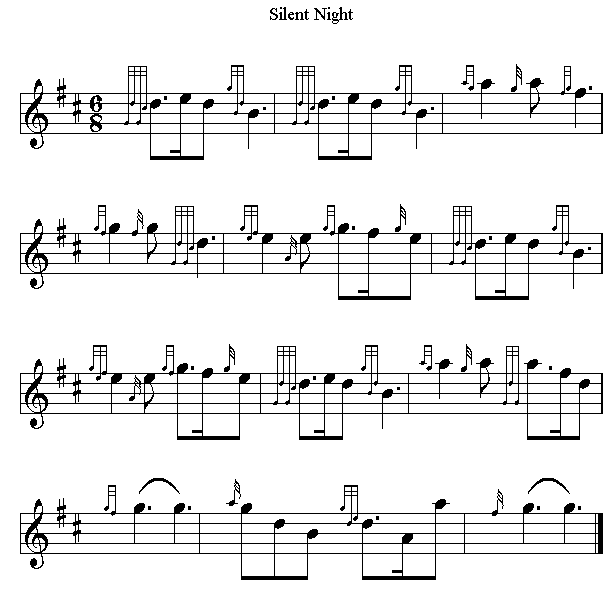 |
||||

Best viewed in
|
Silent Night "Silent Night" was composed in 1818 by Franz Xaver Gruber to lyrics by Joseph Mohr in the small town of Oberndorf bei Salzburg, Austria. Gruber was born on November 25, 1787 in the village of Hochburg-Ach, Upper Austria, the son of linen weavers, Josef and Maria Gruber. Gruber worked as a weaver until the age of 18, then trained to become a schoolteacher. He completed his music education studying with the church organist of Burghausen, Georg Hartdobler. In 1807 Gruber became a schoolteacher in Arnsdorf. He also became the church caretaker and organist. In 1816 he took on the additional responsibilities of organist and choirmaster at St Nicholas Church in the neighboring village of Oberndorf bei Salzburg. Together with Joseph Mohr, a Catholic priest who wrote the original German lyrics, Gruber composed the music for Silent Night. On Christmas Eve of 1818, Mohr, an assistant pastor at St Nicholas, showed Gruber a six-stanza poem he had written in 1816. He asked Gruber to set the poem to music. The church organ had broken down so Gruber produced a melody with guitar arrangement for the poem. The two men sang Stille Nacht for the first time at Christmas Mass in St Nicholas Church while Mohr played guitar and the choir repeated the last two lines of each verse. According to Gruber, Karl Mauracher, an organ builder who serviced the instrument at the Obendorf church, was enamored with the song, and took the composition home with him to the Zillertal. From there, two traveling families of folk singers, the Strassers and the Rainers, included the tune in their shows. The Rainers were already singing it around Christmas 1819, and once performed it for an audience that included Franz I of Austria and Alexander I of Russia, as well as making the first performance of the song in the U.S., in New York City in 1839. By the 1840s the song was well known in Lower Saxony and was reported to be a favorite of Frederick William IV of Prussia. During this period, the melody changed slightly to become the version that is commonly played today. In 1859, the Episcopal priest John Freeman Young, then serving at Trinity Church, New York City, wrote and published the English translation that is most frequently sung today, translated from three of Mohr's original six verses. The song was declared an intangible cultural heritage by UNESCO in 2011.
Lyrics by John Freeman Young
|
|||
